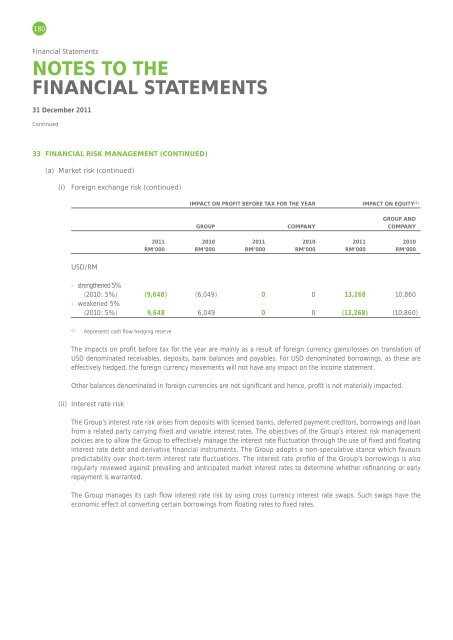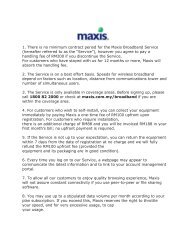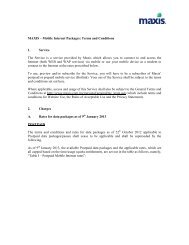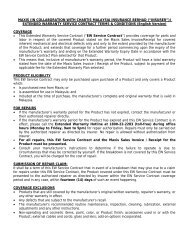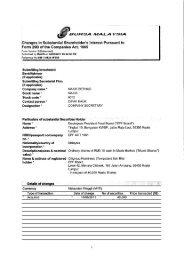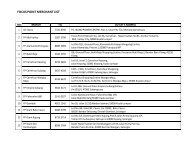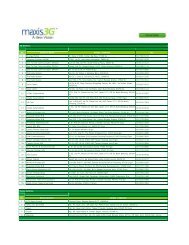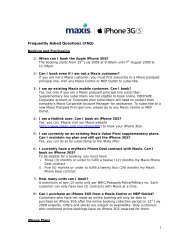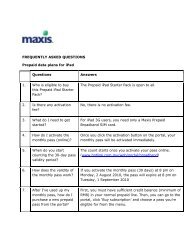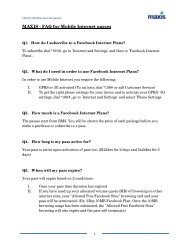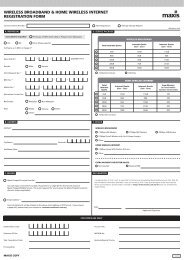- Page 1 and 2:
ENRICHING LIVES EXPANDING HORIZONS
- Page 3 and 4:
CONTENTS Introduction 2 Our Company
- Page 5 and 6:
MAXIS BERHAD ANNUAL REPORT 2011 3 I
- Page 7 and 8:
MAXIS BERHAD ANNUAL REPORT 2011 5 C
- Page 9 and 10:
MAXIS BERHAD ANNUAL REPORT 2011 7 I
- Page 11 and 12:
MAXIS BERHAD ANNUAL REPORT 2011 9 2
- Page 13 and 14:
MAXIS BERHAD ANNUAL REPORT 2011 11
- Page 15 and 16:
MAXIS BERHAD ANNUAL REPORT 2011 13
- Page 17 and 18:
MAXIS BERHAD ANNUAL REPORT 2011 15
- Page 19 and 20:
MAXIS BERHAD ANNUAL REPORT 2011 17
- Page 21 and 22:
MAXIS BERHAD ANNUAL REPORT 2011 19
- Page 23 and 24:
MAXIS BERHAD ANNUAL REPORT 2011 21
- Page 25 and 26:
MAXIS BERHAD ANNUAL REPORT 2011 23
- Page 27 and 28:
MAXIS BERHAD ANNUAL REPORT 2011 25
- Page 29 and 30:
MAXIS BERHAD ANNUAL REPORT 2011 27
- Page 31 and 32:
MAXIS BERHAD ANNUAL REPORT 2011 29
- Page 33 and 34:
MAXIS BERHAD ANNUAL REPORT 2011 31
- Page 35 and 36:
MAXIS BERHAD ANNUAL REPORT 2011 33
- Page 37 and 38:
MAXIS BERHAD ANNUAL REPORT 2011 35
- Page 39 and 40:
MAXIS BERHAD ANNUAL REPORT 2011 37
- Page 41 and 42:
MAXIS BERHAD ANNUAL REPORT 2011 39
- Page 43 and 44:
MAXIS BERHAD ANNUAL REPORT 2011 41
- Page 45 and 46:
MAXIS BERHAD ANNUAL REPORT 2011 43
- Page 47 and 48:
MAXIS BERHAD ANNUAL REPORT 2011 45
- Page 49 and 50:
MAXIS BERHAD ANNUAL REPORT 2011 47
- Page 51 and 52:
MAXIS BERHAD ANNUAL REPORT 2011 49
- Page 53 and 54:
MAXIS BERHAD ANNUAL REPORT 2011 51
- Page 55 and 56:
MAXIS BERHAD ANNUAL REPORT 2011 53
- Page 57 and 58:
MAXIS BERHAD ANNUAL REPORT 2011 55
- Page 59 and 60:
MAXIS BERHAD ANNUAL REPORT 2011 57
- Page 61 and 62:
MAXIS BERHAD ANNUAL REPORT 2011 59
- Page 63 and 64:
MAXIS BERHAD ANNUAL REPORT 2011 61
- Page 65 and 66:
MAXIS BERHAD ANNUAL REPORT 2011 63
- Page 67 and 68:
MAXIS BERHAD ANNUAL REPORT 2011 65
- Page 69 and 70:
MAXIS BERHAD ANNUAL REPORT 2011 67
- Page 71 and 72:
MAXIS BERHAD ANNUAL REPORT 2011 69
- Page 73 and 74:
MAXIS BERHAD ANNUAL REPORT 2011 71
- Page 75 and 76:
MAXIS BERHAD ANNUAL REPORT 2011 73
- Page 77 and 78:
MAXIS BERHAD ANNUAL REPORT 2011 75
- Page 79 and 80:
Maxis Berhad Annual Report 2011 77
- Page 81 and 82:
MAXIS BERHAD ANNUAL REPORT 2011 79
- Page 83 and 84:
MAXIS BERHAD ANNUAL REPORT 2011 81
- Page 85 and 86:
MAXIS BERHAD ANNUAL REPORT 2011 83
- Page 87 and 88:
MAXIS BERHAD ANNUAL REPORT 2011 85
- Page 89 and 90:
• ALIGNED TO CORPORATE STRATEGY A
- Page 91 and 92:
MAXIS BERHAD ANNUAL REPORT 2011 89
- Page 93 and 94:
MAXIS BERHAD ANNUAL REPORT 2011 91
- Page 95 and 96:
MAXIS BERHAD ANNUAL REPORT 2011 93
- Page 97 and 98:
MAXIS BERHAD ANNUAL REPORT 2011 95
- Page 99:
MAXIS BERHAD ANNUAL REPORT 2011 97
- Page 102 and 103:
100 Financial Statements DIRECTORS
- Page 104 and 105:
102 Financial Statements DIRECTORS
- Page 106 and 107:
104 Financial Statements DIRECTORS
- Page 108 and 109:
106 Financial Statements INCOME STA
- Page 110 and 111:
108 Financial Statements STATEMENTS
- Page 112 and 113:
110 Financial Statements STATEMENTS
- Page 114 and 115:
112 Financial Statements STATEMENTS
- Page 116 and 117:
114 Financial Statements STATEMENTS
- Page 118 and 119:
116 Financial Statements NOTES TO T
- Page 120 and 121:
118 Financial Statements NOTES TO T
- Page 122 and 123:
120 Financial Statements NOTES TO T
- Page 124 and 125:
122 Financial Statements NOTES TO T
- Page 126 and 127:
124 Financial Statements NOTES TO T
- Page 128 and 129:
126 Financial Statements NOTES TO T
- Page 130 and 131:
128 Financial Statements NOTES TO T
- Page 132 and 133: 130 Financial Statements NOTES TO T
- Page 134 and 135: 132 Financial Statements NOTES TO T
- Page 136 and 137: 134 Financial Statements NOTES TO T
- Page 138 and 139: 136 Financial Statements NOTES TO T
- Page 140 and 141: 138 Financial Statements NOTES TO T
- Page 142 and 143: 140 Financial Statements NOTES TO T
- Page 144 and 145: 142 Financial Statements NOTES TO T
- Page 146 and 147: 144 Financial Statements NOTES TO T
- Page 148 and 149: 146 Financial Statements NOTES TO T
- Page 150 and 151: 148 Financial Statements NOTES TO T
- Page 152 and 153: 150 Financial Statements NOTES TO T
- Page 154 and 155: 152 Financial Statements NOTES TO T
- Page 156 and 157: 154 Financial Statements NOTES TO T
- Page 158 and 159: 156 Financial Statements NOTES TO T
- Page 160 and 161: 158 Financial Statements NOTES TO T
- Page 162 and 163: 160 Financial Statements NOTES TO T
- Page 164 and 165: 162 Financial Statements NOTES TO T
- Page 166 and 167: 164 Financial Statements NOTES TO T
- Page 168 and 169: 166 Financial Statements NOTES TO T
- Page 170 and 171: 168 Financial Statements NOTES TO T
- Page 172 and 173: 170 Financial Statements NOTES TO T
- Page 174 and 175: 172 Financial Statements NOTES TO T
- Page 176 and 177: 174 Financial Statements NOTES TO T
- Page 178 and 179: 176 Financial Statements NOTES TO T
- Page 180 and 181: 178 Financial Statements NOTES TO T
- Page 184 and 185: 182 Financial Statements NOTES TO T
- Page 186 and 187: 184 Financial Statements NOTES TO T
- Page 188 and 189: 186 Financial Statements NOTES TO T
- Page 190 and 191: 188 Financial Statements NOTES TO T
- Page 192 and 193: 190 Financial Statements NOTES TO T
- Page 194 and 195: 192 Financial Statements NOTES TO T
- Page 196 and 197: 194 Financial Statements NOTES TO T
- Page 198 and 199: 196 Financial Statements NOTES TO T
- Page 200 and 201: 198 Financial Statements STATEMENT
- Page 202 and 203: 200 Financial Statements INDEPENDEN
- Page 204 and 205: 202 SMALL SHOP, BIG DREAMS In busin
- Page 206 and 207: 204 Corporate Governance AUDIT COMM
- Page 208 and 209: 206 Corporate Governance AUDIT COMM
- Page 210 and 211: 208 Corporate Governance AUDIT COMM
- Page 212 and 213: 210 Corporate Governance AUDIT COMM
- Page 214 and 215: 212 Corporate Governance STATEMENT
- Page 216 and 217: 214 Corporate Governance STATEMENT
- Page 218 and 219: 216 Corporate Governance STATEMENT
- Page 220 and 221: 218 Corporate Governance STATEMENT
- Page 222 and 223: 220 Corporate Governance STATEMENT
- Page 224 and 225: 222 Corporate Governance STATEMENT
- Page 226 and 227: 224 Corporate Governance STATEMENT
- Page 228 and 229: 226 Corporate Governance STATEMENT
- Page 230 and 231: 228 OUT OF TOWN NEVER OUT OF TOUCH
- Page 232 and 233:
230 Corporate Governance INTERNAL C
- Page 234 and 235:
232 Corporate Governance INTERNAL C
- Page 236 and 237:
234 Corporate Governance INTERNAL C
- Page 238 and 239:
236 Corporate Governance RISK MANAG
- Page 240 and 241:
238 Corporate Governance RISK MANAG
- Page 242 and 243:
240 Corporate Governance ETHICAL BU
- Page 244 and 245:
242 Analysis of Shareholdings DISTR
- Page 246 and 247:
244 Analysis of Shareholdings 30 LA
- Page 248 and 249:
246 Analysis of Shareholdings INFOR
- Page 250 and 251:
248 Other Information LIST OF PROPE
- Page 252 and 253:
250 Other Information DISCLOSURE OF
- Page 254 and 255:
252 Other Information DISCLOSURE OF
- Page 256 and 257:
254 Other Information DISCLOSURE OF
- Page 258 and 259:
256 Other Information DISCLOSURE OF
- Page 260 and 261:
258 Other Information DISCLOSURE OF
- Page 262 and 263:
260 Other Information DISCLOSURE OF
- Page 264 and 265:
262 Other Information DISCLOSURE OF
- Page 266 and 267:
264 Other Information DISCLOSURE OF
- Page 268 and 269:
266 Other Information DISCLOSURE OF
- Page 270 and 271:
268 Other Information DISCLOSURE OF
- Page 272 and 273:
270 Other Information DISCLOSURE OF
- Page 274 and 275:
272 Other Information DISCLOSURE OF
- Page 276 and 277:
274 Other Information DISCLOSURE OF
- Page 278 and 279:
276 Other Information DISCLOSURE OF
- Page 280 and 281:
278 Other Information DISCLOSURE OF
- Page 282 and 283:
280 Other Information MATERIAL CONT
- Page 284 and 285:
282 Other Information MATERIAL CONT
- Page 286 and 287:
284 Other Information MATERIAL CONT
- Page 288 and 289:
286 Other Information GLOSSARY 2G S
- Page 290 and 291:
288 Other Information GLOSSARY Cont
- Page 292 and 293:
290 MAXIS EXCLUSIVE PARTNERS CENTRA
- Page 294 and 295:
292 Other Information MAXIS EXCLUSI
- Page 296 and 297:
294 Other Information MAXIS EXCLUSI
- Page 298 and 299:
296 Other Information MAXIS EXCLUSI
- Page 300 and 301:
298 Other Information MAXIS EXCLUSI
- Page 302 and 303:
300 Other Information MAXIS EXCLUSI
- Page 304 and 305:
302 Annual General Meeting NOTICE O
- Page 306 and 307:
NOTES
- Page 308 and 309:
fold here STAMP Maxis Berhad (86757
- Page 310:
fold here STAMP Maxis Berhad (86757


